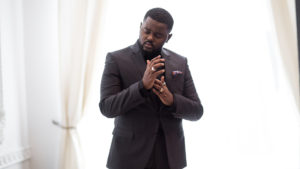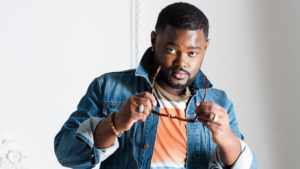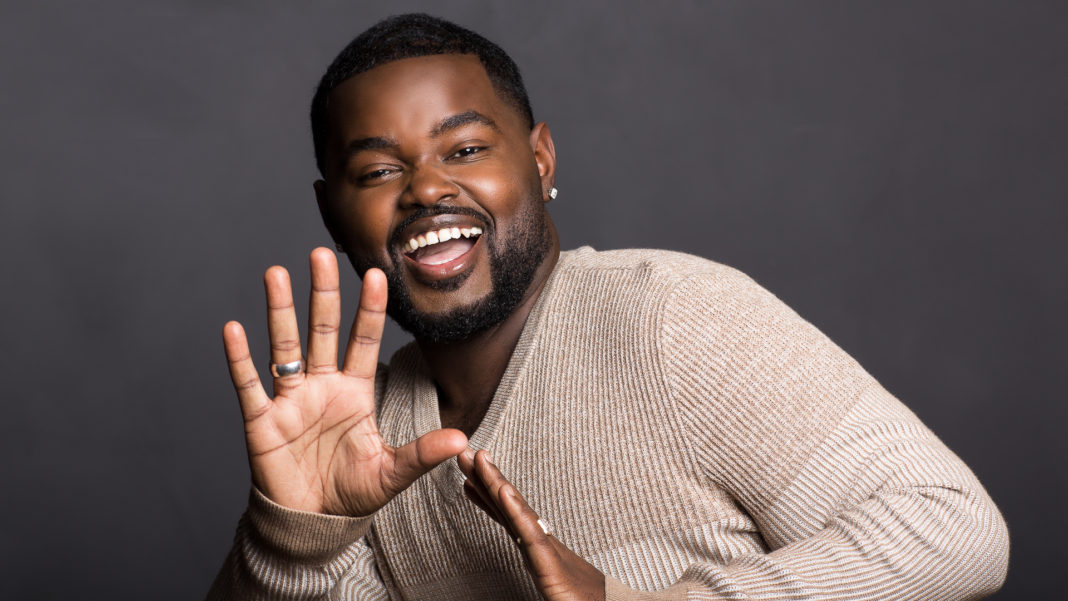If your main exposure to singing is a place like Ellen’s Stardust Diner in Manhattan, you’d be forgiven for thinking a countertenor is the waiter who just served your breakfast and then sang like Frankie Valli. But in the world of professional singing, a countertenor is an adult male singer with the highest singing voice. These are not singers who use their falsetto, but rather men who can naturally sing at this high pitch. One such countertenor is John Holiday. On Friday night he brings his show, The John Holiday Experience: Love & Happiness to The Sorting Room at The Wallis in Beverly Hills.
Holiday was the winner of the 2017 Marian Anderson Vocal Award. The website for the award says the honor “celebrates excellence in performance by recognizing a young American singer who has achieved initial professional success in the area of opera, oratorio, or recital repertory, and who exhibits promise for a significant career.”
He made his LA Opera debut in 2014’s Dido & Aeneas. He’s equally adept at tackling classic countertenor roles in operas by Handel & Vivaldi and newer works by Philip Glass and Huang Ruo. He will also be involved with Matthew Aucoin’s Eurydice when it makes its world premiere at LA Opera in February. (And don’t ask, he won’t reveal any details about that work.)
When I recently spoke with Holiday by phone he revealed that his show will include not just operatic material, but also songs that run the gamut from jazz to spirituals and gospel.
When looking at a list of notable roles for countertenors, it seems like Handel was the main writer of those roles and then they fall off. But the mid-20th century forward composers seem to have rediscovered countertenors. Why do you think the last 75 years have been so good to people who sing in this register?
I think particularly because we have had such a resurgence with fantastic countertenor singers like Alfred Deller, David Daniels, Andreas Scholl and Derek Lee Ragin who has been such a huge inspiration for me. These countertenors have really made it possible for a lot of the countertenors you see out there today.
Or have composers embraced countertenors? David Daniels complained in 2004 that composers don’t write full-boded masculine roles for countertenors as Handel did.

I don’t know that I would agree or disagree. I think David is entitled to have his opinions, so I don’t want to negate anything he said. I can tell you the role of the Refugee in Jonathan Dove’s Flight, that is a full-boded masculine role. What’s masculine and what’s not masculine? Who is the arbiter of what is masculine and feminine? Can you have both? I believe a character is what a character wants to be and it will change from person to person. It may be more masculine for some and more feminine for others. All I am concerned with specifically is that I get the pleasure and joy of playing these fantastic characters.
How did you upbringing influence the show you are doing at The Wallis?
I came up with this idea because I am often in conversations with people in my community and family members about opera. Sometimes there’s a fear they won’t understand what’s going on on stage. I wanted to build a bridge between my community and other communities of color and give them a way into classical music. I come from a background in the church and I sing jazz and soul. Why not do a show singing classical music and jazz? You’ll see me go into spirituals and gospel music, too. As [opera singer] Leontyne Price would say, “that’s my roots.”
If people only see you in a show like Love and Happiness, what do you hope they will learn about who you are as a performer and as a man?
That I love fiercely and that everyone deserves to be loved. Oh God, I get emotional talking about this. Love is around you and near you and close by you if only you open your eyes and hearts. One of the things I love is sharing unashamedly every ounce of who I am. I believe my job as an artist is to be who I am with fierce joy and love. And I hope that the audience will see that emanating from the stage.
Countertenors are faced with stereotypes about being feminine, about being castrated (which is wholly untrue) and more. What should we know about countertenors?
I believe that every countertenor loves the music they sing. That we all have a love for it. I think we all have the genuine desire to allow the music to speak for itself and the character to live and to be who and how and what and where it wants to be.
Growing up I was chastised by other kids for being feminine and I still don’t think I am. But if I were, what’s the problem with it? I know countertenors who are very muscular. I’m not bench-pressing 350 pounds, but I am strong in other ways.

As an African-American countertenor who is also gay, how important is it for you to be the source of visibility for others like yourself?
You are going to make me cry. It’s one of the reasons I’m doing this concert. I want people to know just be who you are. If you don’t see what you want to see on the stage, do your own show. It’s so poignant that they see themselves. I’m hoping with every fiber of my being that I’m a good steward of the gift God has given me and that I’m a good example for the young men and women who are watching me.
On Facebook you dedicated a 2018 recital to the 6-year-old version of yourself. You had a chance to say what you wanted to him. What do you think that 6-year-old would say to you?
I’m proud of you. I’m so happy that you kept going and as he would say, “Keep on running to see what the end would be.” And I love you. Looking back I think my six-year-old self would say thank you for believing in me.
For tickets go here.
Main photo by Fay Fox. All photos courtesy of Unison Media.











